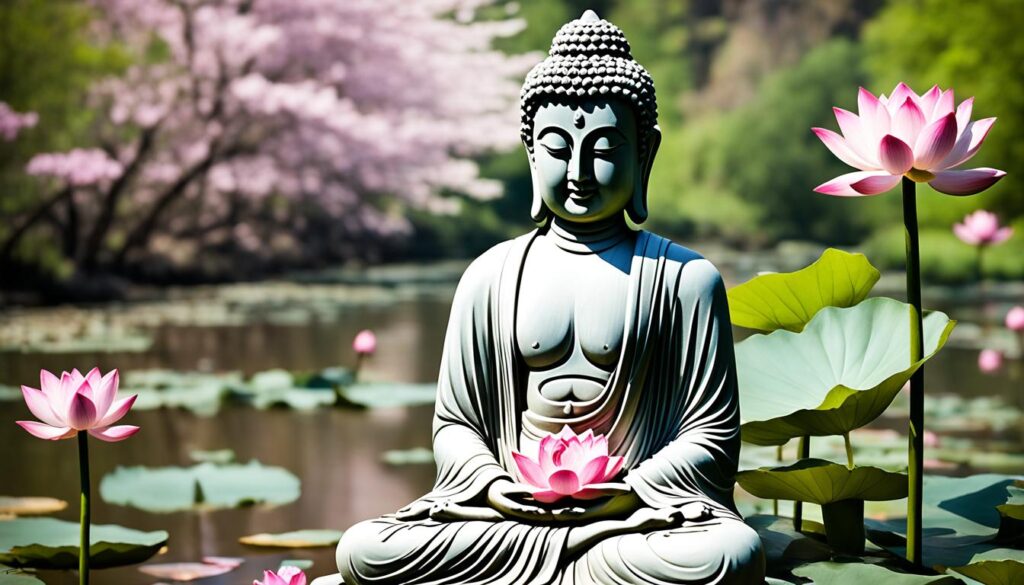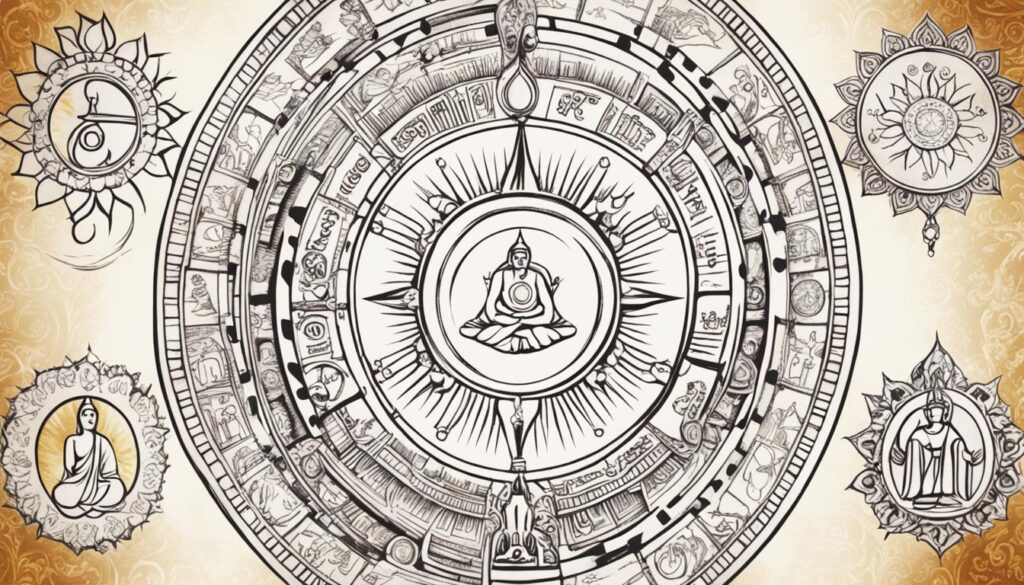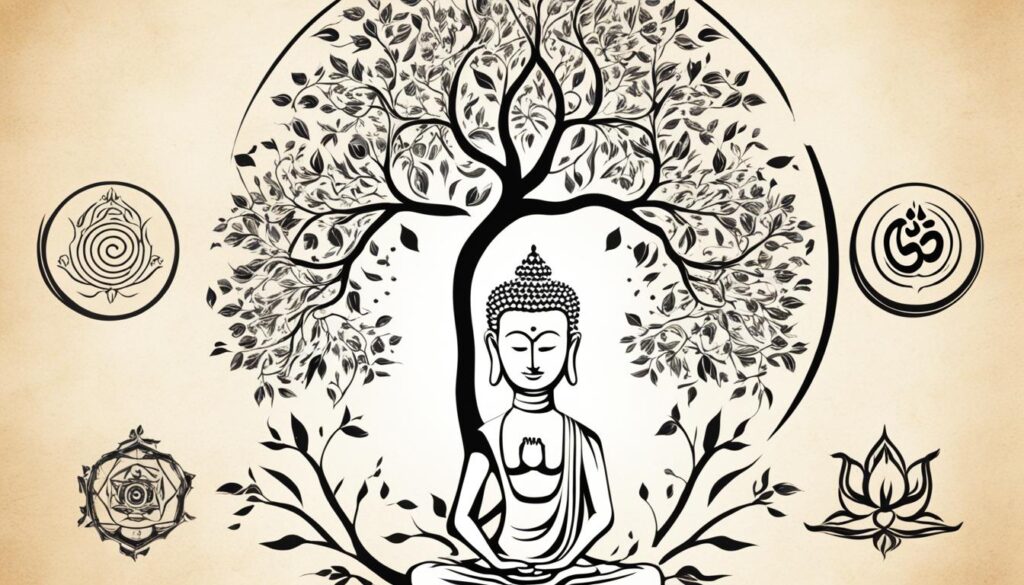Have you ever wondered about the differences and similarities between Jainism and Buddhism? While these two ancient religions are often viewed as similar, they actually have distinct beliefs, practices, and philosophies that set them apart.
- Both Jainism and Buddhism share principles of non-violence and the pursuit of spiritual liberation.
- Jainism places a heavy emphasis on non-violence, discipline, and the elimination of karma, while Buddhism emphasizes mindfulness, compassion, and the elimination of mental suffering.
- Jainism and Buddhism differ in their beliefs about the existence of a supreme being, the concept of reincarnation, and their views on the caste system.
- Exploring the nuances and similarities of Jainism and Buddhism can deepen our understanding of spirituality and personal growth.
Understanding Jainism
Jainism is a way of life and one of the oldest religions in the world. It encompasses a rich tapestry of beliefs, practices, and philosophy that guide its followers towards spiritual enlightenment and liberation.
At the core of Jainism is the principle of non-violence, known as ahimsa. Ahimsa is the practice of compassion and refraining from causing harm to any living being, not only in action but also in thought and speech. This deep reverence for life extends to every form of existence, from humans to animals, plants, and even microscopic organisms.
The pursuit of spiritual enlightenment, known as moksha, is a central aspiration in Jainism. Moksha is the ultimate goal, representing liberation from the cycle of birth and death. This liberation is achieved by eliminating karma, the accumulated effects of our actions, thoughts, and intentions. By practicing self-discipline and self-awareness, Jains seek to minimize the influx of new karma and purify their souls to attain moksha.
To understand the profound philosophy of Jainism, it is essential to explore its principles beyond non-violence and karma. The religion has a rich tapestry of teachings that encompass concepts such as aparigraha (non-possessiveness), anekantavada (relativity of truth), and syadvada (doctrine of conditional predications) among others.
Jainism is often associated with asceticism and renunciation, as some followers choose to lead a monastic life devoted entirely to spiritual pursuits. However, Jainism recognizes that not everyone can or should embrace such a rigorous path. The religion encourages individuals to live a righteous life while fulfilling familial, social, and occupational responsibilities.
In the journey towards spiritual enlightenment, Jains strive to cultivate virtues such as forgiveness, humility, honesty, and self-control. Their commitment to ethical conduct, compassion, and respect for all living beings sets the foundation for a harmonious and peaceful world.
Key Beliefs of Jainism:
- Ahimsa – Non-violence towards all living beings
- Karma – The influence of our actions and intentions
- Moksha – Liberation from the cycle of birth and death
- Aparigraha – Non-possessiveness and detachment
- Anekantavada – The relativity of truth
- Syadvada – Doctrine of conditional predications
Practices in Jainism:
- Meditation and contemplation
- Vegetarianism and veganism
- Fasting and self-discipline
- Pilgrimages and temple visits
- Charity and selfless service
| Beliefs | Practices | Philosophy |
|---|---|---|
| Emphasis on non-violence and compassion | Meditation, fasting, and self-discipline | Ahimsa, karma, moksha, aparigraha |
| Rejection of the caste system | Vegetarianism and veganism | Anekantavada and syadvada |
| Belief in the relativity of truth | Pilgrimages and temple visits | Seeking inner peace and self-realization |
Exploring Buddhism
Buddhism is a profound spiritual tradition that offers valuable insights into the pursuit of enlightenment and the alleviation of mental suffering. Rooted in the teachings of the Buddha, Buddhism encompasses a rich philosophy, beliefs, and practices centered around mindfulness, compassion, and self-reflection.
Central to Buddhism is the concept of mindfulness, which involves the intentional awareness of the present moment with non-judgmental acceptance. Mindfulness allows individuals to cultivate a deep sense of self-awareness and insight into the nature of reality. By developing a mindful approach to life, one can discover inner peace and harmony.
Compassion is another fundamental principle of Buddhism. It involves the cultivation of empathy, kindness, and a genuine concern for the well-being of all living beings. Practicing compassion allows one to transcend self-centeredness and fosters connections with others, promoting harmony and understanding in society.
In Buddhism, the ultimate goal is to attain enlightenment or nirvana, a state of liberation from suffering and the cycle of rebirth. This pursuit of enlightenment involves the cultivation of wisdom, understanding, and the eradication of desires and attachments that lead to suffering. By transcending the ego and embracing a deeper understanding of impermanence and interconnectedness, individuals can attain enlightenment and experience true freedom.
Through meditation, ethical conduct, and the study of Buddhist scriptures, individuals can embark on their own personal journey towards enlightenment. Buddhism provides practical guidance and teachings that can be applied in daily life to cultivate greater inner peace, compassion, and spiritual growth.

Benefits of Buddhism in Modern Life
- Cultivating mindfulness can reduce stress, anxiety, and enhance overall well-being.
- Practicing compassion promotes harmonious relationships and social harmony.
- Gaining insights into the nature of suffering helps individuals find meaning and purpose in life.
- Buddhist teachings provide frameworks for ethical conduct, guiding individuals towards virtuous actions.
- Embracing impermanence and non-attachment empowers individuals to overcome challenges and find contentment.
Incorporating Buddhist principles and practices into our lives can lead to profound personal transformation and societal change. By exploring Buddhism, individuals can cultivate mindfulness, compassion, and enlightenment, fostering a greater sense of peace, happiness, and interconnectedness in our world.
Key Similarities Between Jainism and Buddhism
When exploring Jainism and Buddhism, it becomes evident that these ancient religions share several fundamental principles, beliefs, and practices. These commonalities provide a basis for understanding their shared philosophies and spiritual paths.
Non-Violence and Compassion
Both Jainism and Buddhism emphasize the value of non-violence and compassion towards all living beings. Ahimsa, the principle of non-violence, lies at the core of Jainism. Buddhists also follow the principle of non-violence as they strive to alleviate suffering and cultivate compassion in their interactions and thoughts.
Pursuit of Spiritual Liberation
Jainism and Buddhism share a common goal of spiritual liberation and the attainment of enlightenment. In Jainism, the liberation from the cycle of birth, death, and rebirth is known as moksha. Buddhists seek to achieve nirvana, a state of ultimate bliss and liberation from the cycle of suffering.
Rejection of the Caste System
Both Jainism and Buddhism reject the societal hierarchy imposed by the caste system. They advocate for equality among all individuals, irrespective of their social standing, and emphasize the importance of treating everyone with respect and dignity.
Self-Discipline and Self-Realization
Jainism and Buddhism emphasize the significance of self-discipline and self-realization on the path towards spiritual growth. Followers of both religions are encouraged to cultivate inner virtues, practice mindfulness, and engage in ethical conduct to attain personal and spiritual development.
To further understand the similarities and differences between Jainism and Buddhism, let’s explore a detailed comparison:
| Jainism | Buddhism |
|---|---|
| Believes in the existence of eternal souls (jiva) and non-living substances (ajiva). | Does not believe in eternal souls or external entities. |
| Existence of a supreme being (Isvara) is not a central aspect. | Does not worship or rely on a supreme being. |
| Believes in the cycle of birth, death, and rebirth (samsara). | Teaches the concept of rebirth but emphasizes the impermanence of existence. |
| Rejects the hierarchical caste system and promotes equality among all individuals. | Rejects the caste system and advocates for social equality and justice. |

As you can see, even though Jainism and Buddhism have their unique characteristics and perspectives, their commonalities in beliefs, practices, and values serve as a reminder that spiritual growth and harmony can be achieved through various paths.
Contrasting Beliefs and Practices
In exploring the differences between Jainism and Buddhism, it becomes evident that these two ancient religions diverge on fundamental beliefs and practices. These distinctions shape their perspectives on various aspects of spirituality, including the existence of a supreme being, the concept of reincarnation, and their views on the caste system.
Jainism does not recognize or worship a specific deity or supreme being. Instead, followers believe in the potential divinity within every living being, emphasizing the concept of individual agency and responsibility. The focus is on attaining spiritual enlightenment through the elimination of karma, which is achieved through intense self-discipline, meditation, and non-violence (ahimsa). Therefore, Jainism’s belief system is characterized by a strong emphasis on personal and societal ethics, emphasizing the interconnectedness of all living beings.
On the other hand, Buddhism does not reject the existence of a supreme being outright, but it is not a central element of Buddhist belief. Buddhism places a primary focus on the teachings and enlightenment of Siddhartha Gautama, also known as the Buddha. Buddha emphasized the impermanence and suffering inherent in life and introduced the four noble truths and the noble eightfold path as a guide to attaining liberation from suffering and achieving enlightenment. According to Buddhism, enlightenment is attainable through mindfulness, meditation, and compassion towards all sentient beings.
Regarding the concept of reincarnation, Jainism and Buddhism also differ in their interpretations. Jainism embraces the idea of an eternal soul (jiva) that transmigrates from one body to another, believing in the cyclical nature of life and death. In Jainism, the goal is to break the cycle of rebirth by freeing oneself from the karmic burden and achieving spiritual liberation (moksha).
In contrast, Buddhism views the concept of reincarnation as a cycle of rebirth driven by ignorance and attachment. The ultimate aim in Buddhism is to attain nirvana, the cessation of suffering and the liberation from the cycle of rebirth. Instead of focusing on the existence of a permanent soul, Buddhism emphasizes the impermanence of all things and the concept of no-self (anatman).
Additionally, Jainism and Buddhism hold contrasting views on the caste system, a hierarchical social structure in traditional Indian society. Jainism recognizes the inherent equality of all living beings and rejects any discrimination based on caste or social status. It promotes the idea of equality and non-violence among all individuals, irrespective of their social standing.
Buddhism, like Jainism, criticizes the caste system and advocates for equality. However, Buddhism takes a more pragmatic approach by not directly challenging the caste system but focusing on individual liberation and social harmony. The teachings of Buddha offer insights into the interconnectedness of all beings and emphasize compassion and non-discrimination as core values.
Through an analysis of the contrasting beliefs and practices of Jainism and Buddhism, we gain a deeper understanding of the unique perspectives and spiritual paths each religion offers. The dynamic interplay between these two ancient traditions continues to shape the spiritual landscape of humanity.

Key Contrasts between Jainism and Buddhism Beliefs and Practices:
| Jainism | Buddhism |
|---|---|
| Emphasis on non-violence (ahimsa) | Focus on mindfulness and compassion |
| Belief in the eternal soul (jiva) | Emphasis on the impermanence of all things and no-self (anatman) |
| Rejects the caste system and promotes equality | Criticizes the caste system and advocates for social harmony |
Historical and Philosophical Background
Jainism and Buddhism, two prominent religions that originated in ancient India, have had a profound influence on the region’s history and philosophy. Both religions were founded by spiritual leaders who sought to bring about spiritual enlightenment and liberation from suffering.
Jainism, believed to be one of the oldest religions in the world, traces its origins back to the 6th century BCE. It was founded by Mahavira, a spiritual teacher and ascetic who dedicated his life to the pursuit of ultimate truth and the attainment of liberation.
Buddhism, on the other hand, was established by Siddhartha Gautama, also known as Gautama Buddha, in the 5th century BCE. Born into a royal family, Siddhartha renounced his privileged life to seek a deeper understanding of human suffering and the path to its elimination.
Both Jainism and Buddhism emerged in a time of great philosophical and spiritual exploration in ancient India. They shared a common cultural and intellectual environment, which influenced the development of their teachings and practices.
The philosophy of Jainism revolves around the concepts of ahimsa (non-violence), karma (the consequences of our actions), and moksha (liberation from the cycle of birth and death). Jains strive to practice non-violence in every aspect of life, from their thoughts and words to their actions. They believe that by living a life of discipline, purity, and non-attachment, one can attain spiritual enlightenment and ultimate liberation.
Buddhism, on the other hand, is based on the Four Noble Truths and the Eightfold Path. The Four Noble Truths identify the existence of suffering, the cause of suffering, the cessation of suffering, and the path to the cessation of suffering. The Eightfold Path consists of eight principles that guide individuals towards right understanding, thought, speech, action, livelihood, effort, mindfulness, and concentration. By following this path, Buddhists seek to attain nirvana, a state of complete liberation and freedom from suffering.
Both Jainism and Buddhism share a deep respect for the interconnectedness of all living beings and emphasize the importance of compassion and selflessness. They advocate for living a life of purpose and ethical conduct, seeking to cultivate virtues such as generosity, kindness, and wisdom.

By examining the historical and philosophical background of Jainism and Buddhism, we gain valuable insights into the origins and teachings of these ancient religions. Their teachings continue to inspire and guide millions of people around the world, offering profound wisdom for personal growth and spiritual enlightenment.
Conclusion
In the comparison between Jainism and Buddhism, it becomes clear that while these two ancient religions share some similarities, they also have significant differences in their beliefs, practices, and philosophical foundations. Exploring these nuances can lead to a deeper understanding of spirituality and personal growth.
Jainism and Buddhism both emphasize the importance of non-violence and the pursuit of spiritual liberation. However, Jainism places a stronger emphasis on the concept of non-violence, known as ahimsa, and the elimination of karma as a path to achieving spiritual enlightenment.
On the other hand, Buddhism focuses on mindfulness, compassion, and the elimination of mental suffering. The teachings of Buddha provide guidance for achieving personal and societal harmony, and the ultimate goal is the attainment of enlightenment, known as nirvana.
Furthermore, Jainism and Buddhism differ in their beliefs concerning the existence of a supreme being, the concept of reincarnation, and the view on the caste system. Jainism does not recognize a supreme being, while Buddhism is generally agnostic or atheistic. Jainism believes in the transmigration of the soul, whereas Buddhism teaches the concept of rebirth. Additionally, Jainism places more emphasis on equality among castes, while Buddhism rejects the caste system altogether.
By understanding the similarities and differences between these two religions, individuals can broaden their knowledge of ancient religious traditions, gain insights into different philosophies, and nurture a sense of respect and understanding for diverse belief systems.
FAQ
Are Jainism and Buddhism similar?
While Jainism and Buddhism share some common principles such as non-violence and the pursuit of spiritual liberation, they also have significant differences in their beliefs and practices.
What are the key beliefs and practices of Jainism?
Jainism places a strong emphasis on non-violence (ahimsa), discipline, and the pursuit of spiritual enlightenment (moksha) through the elimination of karma.
What is the core philosophy of Buddhism?
Buddhism teaches that the path to enlightenment (nirvana) involves the practice of mindfulness, compassion, and the elimination of mental suffering.
What are the similarities between Jainism and Buddhism?
Jainism and Buddhism both emphasize principles such as non-violence, the pursuit of spiritual liberation, and the importance of self-discipline and self-realization.
How do Jainism and Buddhism differ in their beliefs?
Jainism and Buddhism differ in their beliefs about the existence of a supreme being, the concept of reincarnation, and their views on the caste system.
What is the historical and philosophical background of Jainism and Buddhism?
Jainism and Buddhism originated in India and have had a significant impact on the region’s history and philosophy. Both religions were founded by spiritual leaders who sought to bring about spiritual enlightenment and liberation from suffering.
Can exploring Jainism and Buddhism deepen our understanding of spirituality?
Exploring the nuances and similarities of Jainism and Buddhism can certainly deepen our understanding of spirituality and personal growth.

